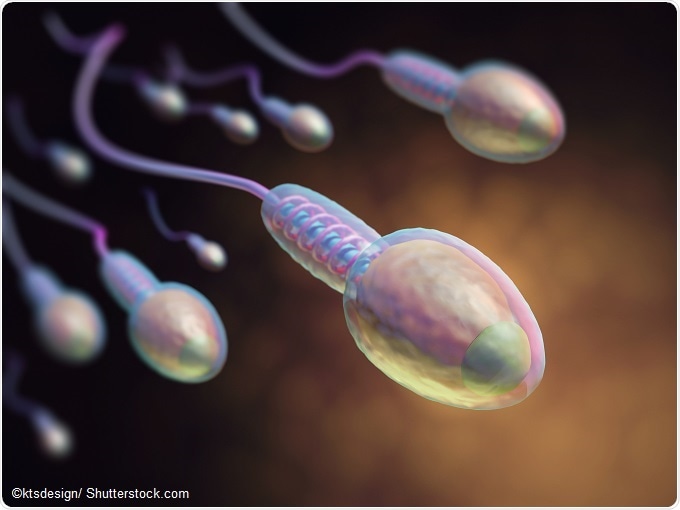In some cells, gene “a” is turned on, while in other it's turned off. There’s an expression pattern across the genome, which is what epigenetics does.
The reason epigenetics is important in fertility is that we think it provides a biomarker for potential problems with sperm function and early embryo development.
Episona's Seed Fertility Test
How common is male factor infertility?
Infertility as a couple problem is fairly common: it affects about one in seven couples, which is about 15% of the population. In the US, that leads to about 1.2 million couples seeking fertility care.
The general consensus, in terms of who is responsible for the infertility, is that it is about 30% exclusively female, 30% exclusively male and for about one-third of couples, it is both the male and the female.
What explanations can semen analysis provide?
The semen analysis looks at count (whether you have sperm and how many), morphology (the shape of the sperm) and motility (how well the sperm swim).
The information is limited, but the important factor that the test can determine is whether sperm is present or not, i.e. whether someone is azoospermic, which happens in slightly less than 10% of infertility cases in men.
Morphology is a little bit murkier, but the general consensus is that the sensitivity is fairly low, while the specificity can be quite high, particularly in azoospermic cases.

Why can’t semen analysis always provide the answer to male infertility?
Semen analysis doesn't inform how the sperm, particularly the sperm DNA, will help and influence embryo development. In terms of sperm function, the semen analysis doesn't really inform on things like chemotaxis, which is how well that sperm is going to be able to find the egg.
Secondly, semen analysis cannot tell us about penetration, the process of getting that sperm and its DNA into the egg so the embryo can start to form. The embryo development also can't be seen with semen analysis.
What innovations are taking place in male factor infertility?
Some people are poking around in genetics, but I wouldn't say that's been moving terribly fast or furiously. I think the big innovations are the opportunities for home testing.
There is a company called YO, which has technology that was developed at Harvard. The basic idea is they have a microscopic camera system that can attach to your iPhone, it can be used to look at a semen sample and give you count information and some information about motility.
As far as basic semen analysis is concerned, I think we're at a point where a lot of information can be gathered at home, which I think is interesting and certainly helpful. However, the problem from our perspective that still exists, is that semen analysis is of limited use in terms of the information it can provide.
We aren’t aware of anyone else that is doing anything in terms of epigenetics and sperm and there is limited data in genetics.
In the cases of azoospermia, some genetic factors may be at play. There may be microdeletions in the Y-chromosome and using a genetic test can inform whether that is the cause, or at least partly why you're azoospermic. Beyond that, it doesn't really help inform about fertility problems in men.
What is Episona’s vision?
We're trying to improve reproductive outcomes by giving better information. We look at the epigenetic profile, specifically DNA methylations, which are methyl groups that bind to DNA.
The pattern of DNA methylation may be normal or disrupted. We look at disruptions and correlate them to increased risk of male factor and an increased risk of poor embryo development. We have shown that the epigenetic profile, or DNA methylation profile, can inform those two things significantly.
Why Take Seed?
Can you please outline the science behind Episona’s Seed?
Before we started, there were probably over twenty academic groups and over a hundred peer- reviewed scientific publications that have looked at changes in DNA methylation in sperm and correlated that with problems with infertility in men.
We got together with one of the most premier researchers in the States, Douglas Carrell, from the University of Utah, who is one of the co-founders of the company. We asked him whether he thought the time was right and whether the science was mature enough to develop a test for infertility that would look at this. He thought so, so we incorporated at the end of 2013.
We published a large proof-of-concept study in Fertility and Sterility, proving that the concept of a screening test for male infertility was viable. Then we raised money and did a larger prospective study that we're now in the process of writing up and publishing. That was consistent with what we found in the original proof-of-concept study.
Overall, as a company, we have probably looked at well over seven hundred epigenetic profiles in infertile men to make our assessment and there are probably, again, a hundred peer reviewed publications beyond our own work that support the thesis.
What stage of development are you currently at?
We began operating the test in October of last year, which was announced at the American Society for Reproductive Medicine. We started selling at that point and we're now offering and providing the test in about 25 clinics, which translates to about 5% of the fertility market in the US.
Is the test only available in the US at the moment?
It is in the US and we also have one or two clinics in Canada. We are having conversations about international use, but that's less urgent for us at the moment.
What further research is needed to fully understand the role of sperm epigenetics in fertility?
I think we have good information and data that support utility in certain aspects. In terms of fully understanding, I think that in the scientific community, it's an ongoing process.
Broadly speaking, we can recognize male factor, when you couldn't with another assay and we can recognize the problems of embryo development.
Areas we want to move into and provide more utility in are those such as the current pregnancy loss and how that informs things like varicocele and urology. I think there are lots of other fertility-related indications that we could branch into.
We've got to a point where the data is interesting and provides utility in some cases, but there's still lots of room to expand. We're continually developing our research too and constantly analyzing our data to see how else we can use it.
Where can readers find more information?
Episona website
About Alan Horsager, PhD
Alan Horsager is currently the President & CEO of Episona, an epigenetics data company focused on improving outcomes in reproductive health.
 Most recently, he was a Founder and Chief Science Officer of Eos Neuroscience, a company that continues to engineer optogenetic gene therapies for blindness and chronic pain.
Most recently, he was a Founder and Chief Science Officer of Eos Neuroscience, a company that continues to engineer optogenetic gene therapies for blindness and chronic pain.
Prior to Eos and while at the University of Southern California, he worked closely with Second Sight Medical Products to produce the first ever treatment of neurological blindness, a medical device that is now approved by the FDA for the treatment of retinitis pigmentosa.
Before joining USC, he was a Project Manager and Researcher at VivoMetrics, a medical device startup that developed a wearable ambulatory monitoring system that continuously collected cardiopulmonary data.
Alan received his B.A. in Psychology for the University of Washington and his Ph.D. in Neuroscience from the University of Southern California where he currently is a visiting Research Assistant Professor in the Department of Ophthalmology.
He has numerous scientific publications and issued patents, and has received several career awards including the Burroughs Wellcome Fund CASI award.